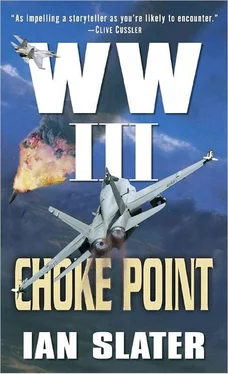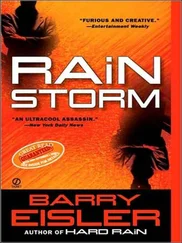“Fine,” said Charles, and when he got to the new room, immediately dialed CNN Atlanta. The toilet-stuffing ploy for a new room had been an old China hand’s trick to escape the electronic bug that the authorities — in this case from either Homeland Defense and/or Ashcroft-trained FBI agents — had no doubt planted to listen in on phone calls.
The friendly young woman’s voice in Atlanta told him that Marte Price was on assignment. Would he like to leave a voice mail? No, he wouldn’t. “Tell her I have a good story vis-à-vis the PLA’s General Chang, that Chang may have stumbled upon a deal between Beijing and Li Kuan.”
“What was that about a visa, sir?”
“Visa?” asked Riser.
“Yes, sir. You said you had a good story—” Riser could hear the shuffling of paper on the other end, then the voice came on again. “Yes, something about a visa . You mean a travel document, sir, or a credit card? A credit card scam?”
Riser rubbed his forehead in frustration. “No, that was vis-à-vis —it means with regard to — a story about General Chang being important because he found out about — Look, would you please call her, give her this number.” He read it out slowly, adding, “It’s urgent. If I don’t hear from her in an hour I’ll call Fox. Point is, if she hears later that I called and it’s been on another network she’ll be totally freaked!”
“I understand, sir.”
Riser hoped so.
“Mr. Riser?”
“Yes.”
“Charles Riser, cultural attaché?”
“Yes. Is this Marte Price?”
“It is. Returning your call. I’m actually not that far away — in Port Townsend covering, or rather trying to—”
“Can we meet?”
“Ah, can you tell me on the phone? E-mail?”
Riser laughed, uncharacteristically rude. “Are you serious?”
“It’s difficult for me at the moment to drive down to Seattle. The roads are clogged with people, traffic jams. No flights either. The fog is — well, very bad.”
“Then how am I supposed to tell you? Beam myself up there?”
Marte Price was a tough veteran of the media, but she was taken aback by the man’s aggressiveness. Her assistant at CNN had said he’d been “pleasant enough,” actually a rather timid-sounding man. Not this guy. “Mr. Riser, there are no civilian helo charters up here, but in a city the size of Seattle I’m sure you could get some local pilot who knows the terrain well enough for the right price.” She paused. “How about this: CNN’ll pay half the charter, and if the story’s as important as you say it is, we’ll spring for the whole lot?”
Charles was gazing at the plum-colored brick wall opposite his hotel, the wall festooned with spiderwebs, moths trapped in many of them, some still alive. He turned away, looking instead at his “single” room’s flickering TV, its ribbon report giving details of an American battle group, its carrier, McCain , having been attacked. Typically, the first reports of the carrier having been bombed or attacked by missiles were being corrected by updates. It seemed that only one plane had been involved. “Extensive damage,” CNN reported, but no pictures as yet.
“Mr. Riser,” came Marte Price’s voice. “Are you still there?”
“I’m not worried about the money,” Charles told her. “I’ll find a local and come up.”
“Good.” They arranged to meet at a Port Townsend hotel.
“One thing more, Mr. Riser. Why did you insist on seeing me —why not call the local CNN affiliate or—”
“Everyone watches you.”
“Well, thank you. I look forward to seeing—” But all she could hear now was a dial tone.
“What a rude bastard!” she announced to her cameraman, slamming down her phone.
Riser’s truculence had come out of a bottle of Jack Daniel’s. Used to neither spirits in general nor forty-proof whiskey in particular, and given Mandy’s murder, the terrible state his homeland was in, and being recalled — like a “loser,” as he’d heard an embassy colleague refer to him in the final days — had all proven too much. He’d begun drinking heavily, which, to his surprise, had not relieved his acute anxiety and depression. Instead, it had brought out the worst in him, behavior he was thoroughly ashamed of a few hours later at SeaTac as he strapped himself into the chartered helo, then put his head back, staring at the surly gray fog outside.
“Don’t worry,” said the hefty, bearded pilot cheerily. “I’ve been instrument-flying in this soup. Hell, in ’Nam—”
“Excuse me,” said Charles, gently massaging his throbbing temple with an ice pack he’d gotten from the hotel. “I don’t mean to be rude, but would you mind not talking? I’m feeling kind of—”
“Tie one on, did you?” replied the pilot, grinning. “Know how it feels, buddy.”
“Yes,” said Charles, whose senses were suddenly assaulted by a blast of rap noise.
“Do you, can you — please turn that off!”
The pilot’s face was close to shock. “Don’t like music?”
Charles’s eyes closed.
“Okay, you’re payin’ for it.”
“Have you any water?” Charles asked.
“You betcha!” the pilot said, though the frown of mystification remained on his face.
Charles took two more aspirin.
It turned out to be a surprisingly smooth ride, compared to the violent last leg of the flight from China, the pilot yelling only twice, first to tell Charles that he was following the line of Puget Sound—“God’s country! ’Course, can’t see a friggin’ thing today”—and later to announce, “Be down in about fifteen.”
Charles merely nodded, the aspirin he’d taken causing the headache to abate but now making him feel nauseated. His hands were shaking.
Aussie’s Special Forces training had instilled in him a love of climbing up things but a fervent dislike of going down them, finding the restraint his muscles had to exert during descent often was more taxing than when he was ascending.
“I like going down,” Sal had once quipped, “if she’s good looking.”
Aussie had affected such an air of propriety and shock that even David Brentwood, who ignored sexual ribaldry, had joined in the team’s laughter at Aussie’s performance. But now there was no humor in Aussie as he ran back down the precarious S-shaped path on the side of the cliff, his Vibram boots gripping and braking hard in the damp, loamy soil. His gloved hands did their part as he slid on his backside here and there and grabbed, released, and grabbed again at the thick vegetation to brake his rapid descent. Freeman, seeing Aussie’s fast, controlled descent, wondered if he could have done it as speedily. In the final segment of the S curve, Aussie came off the cliff as if from a short, steep waterslide, his boots sending warm ash from the edge of the fires into the air like gray talc.
“Fog and more fog, correct?” said Freeman, handing Aussie his canteen.
“No,” answered Aussie, his macho streak trying but failing to contain his excitement. “You were right, General. Fog’s layered — tip of a high radio mast spiking through it. Not all the time, but I spotted it twice.”
“You get a GPS?”
Aussie took off his left glove, having written the latitude and longitude on his hand.
Sal and Choir could tell something was up as Freeman and Aussie ran toward them. “We go!” the general called out. With that, the two, grateful for the relief from the outrage and helplessness they’d been feeling since discovering Dixon’s mutilated body in the cave, quickly pushed the aluminum boat on the wobbly trailer to the kelp line. Choir pulled the Mercury’s cord rather than use up the starter motor’s juice as he and his three comrades-at-arms got aboard, heading out to the mast’s position. Was it the Skate or the Petrel ? The position of the mast that Aussie had pinpointed by the GPS was 2.3 miles due north — well and truly out in the strait.
Читать дальше












